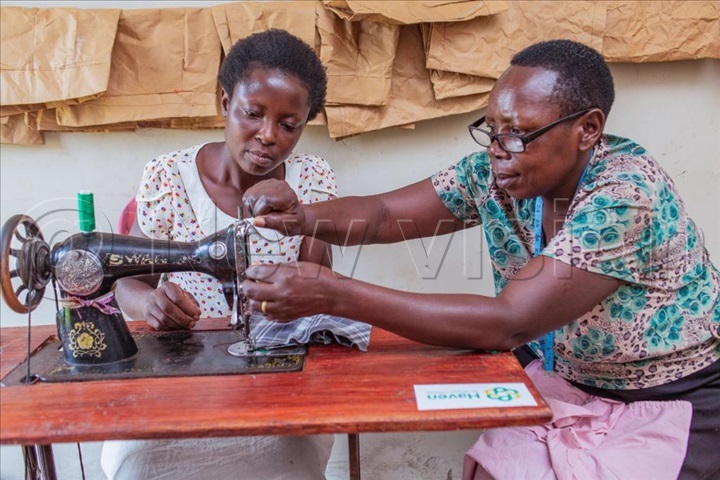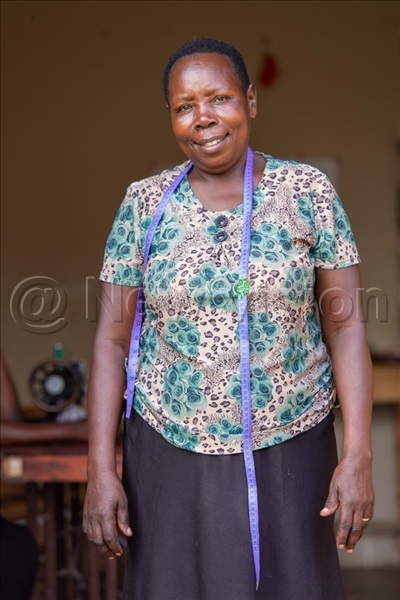The streets have nurtured me into a father
Oct 12, 2020
From stealing to shoplifting and countless times in jail, Emilio Mpimbaza has wethered the storms of a harsh street life. However, rather than wallow in self-pity, he has dedicated his life to looking after street children through his organisation, Haven for African Children.

Early life
"Our family was enviable before our parents divorced. As the last-born, I was loved and pampered," Mpimbaza remembers.
He was about three years old then and had just enrolled into a nearby kindergarten when life took a turn for the worst.
It all started when their father lost his job. Fights became the order of the day as their father felt intimidated by their mother, who had become the sole breadwinner from her bar business.
The fights persisted until they separated.
"We were split; I and my brother went to stay with dad in a small house in Kololo, Kampala," Mpimbaza recalls.
His two sisters remained with their mother in the house along Ridgeway Drive in Kololo. Since then, he has never heard from them again.
"I last heard that mum got married to a soldier and they moved upcountry. I do not know what happened to my sisters," he says.
Abusive father
Mpimbaza and his brother did not find any peace with their dad as he constantly battered them whenever they asked for necessities like clothes.
His brother dropped out of school in Primary Five and todate, he is still on the streets, in his late 30s.
"Dad was loving before he lost his job. It is now that I realise that he tortured us out of depression. He needed counselling to come to terms with the separation, which he did not get," Mpimbaza says.
His father also turned to heavy drinking and at the end of it all; he abandoned his responsibilities towards the children.
"Dad would return in the night to beat us. He did not bother that we had slept on empty stomachs," Mpimbaza recalls.

The boys braved the suffering until Mpimbaza's brother lost hope and escaped from home to the ghetto in Kamwokya.
He slept in the gutters and ate from bins. Back home, Mpimbaza faced the ugliest form of torture from his father upon learning of the departure of his brother.
He had nowhere to run and nobody to turn to. Even the neighbours could not help and he did not know any relative.
Going to the streets
The young boy wore tattered clothes on a bonny and bruised body. Two months later, his brother picked him. "I had just turned four.
I was happy to see my brother again. He asked me to follow him to the ‘Promised Land' and I was thrilled. Little did I know that hard life awaited me," he reminisces.
"The first month was terrible. We slept in sacks on the dirty, cold verandas and ate from the bins to survive," he remembers.
He fell sick with diarrhoea and malaria. Mpimbaza's brother tried to find a remedy in vain.
He could not afford to take him to hospital. When Mpimbaza's situation deteriorated, his brother carried him and dumped him in their father's compound.
"The neighbours nursed me, but when I recovered, dad resumed his old ways of battering me," he recollects.
Left with no choice, Mpimbaza escaped back to Kamwokya to reunite with his brother, Benitez, as he is known on the streets.
Unfortunately, he discovered that he had been jailed over robbery.
I needed food
"I first slept in Pentecostal churches during overnight prayers, but this was unsustainable. Later, I got a permanent home in the downtown gutters," he says.

All that mattered to him was food. He did not mind that he spent weeks without bathing and changing clothes.
However, when needed to bathe and do laundry, he would go down to Nakivubo Channel, around St Balikuddembe Market.
"Since I only had one set of clothes, I would wash and wait for them to dry," he explains.
"I quickly learnt to pick pocket, shoplift and break into shops to make ends meet," he says, adding that he was jailed countless times.
Mpimbaza dreaded the Police and ambushes by city enforcement officers on the streets.
Managing cold nights
At night, he would slip into a sack beside his friends and sleep.
"The nights could get so cold, especially on rainy days. This is why street children abuse drugs to be able to warm up and sleep off," he says.
Mpimbaza was so addicted to drugs that his rehabilitation took long. He recalls a nasty experience on the streets when his close friends were swept away by floods before his own eyes.
"We would sleep inside the trenches, where it is warm, but it is hard to get out in a rush," he says.
On that fateful night, the floods got Mpimbaza and his friends in the trenches. They got trapped, but he miraculously survived.
The psychological torture of seeing his friends drown in the floods was immense.
"We were not allowed to mourn them. Whoever died would be picked like a dog and buried by the authorities. This hurt me deeply," he says.

Street life was hash for the young Mpimbaza. When he turned seven, he reunited with his brother, who had just been released from Luzira Prison, but he could not help him much because he was broke and debilitated due to drug abuse.
"I was fed up of this life. The fights were many among us and with the authorities. Many people rejected us and this hurt me," he recalls.
They fought over dominion, food, loot, among others. At nine years, Mpimbaza decided to return home.
His father had shifted to Bukoto, a Kampala suburb, but he managed to trace him with the help of neighbours.
"He wasn't happy to see me, but he allowed me to stay. A few days later, I connived with my street friends and we broke his briefcase, hoping to find money in vain," he narrates.
He escaped back to the streets after.
Mpimbaza often got a chance to be rescued off the streets by different organisations, but he would find life in their homes boring and restrictive. He would go back to the streets.
Narrow escape When he was about 10 years old, one day, life took a turn for the worst.
Adjacent to his father's house was a big garage, where he would always sneak with his friends and steal vehicle spare parts, which they sold as scrap.
One fateful night, under his command, they invaded the garage in the wee hours of the night when the security guard was asleep.
"I was the first to climb over the perimeter wall and, thereafter, signalled my colleague to follow suit. I then quietly landed inside," he says.
Regrettably, Mpimbaza's colleague landed with a bang that awoke the guard, who gunned him down instantly.
Mpimbaza was lucky to escape through a small opening in the fence, which he discovered for the first time.
"I was terrified and devastated to lose my best friend, who loved and cared for me like a brother. He was a little older than me," he reminisces.
Turning point
The incident was Mpimbaza's turning point. He signed himself into an orphanage; Save the Street Children in Kamwokya, where he had been and left several times.
They welcomed him, but with reservations. They enrolled him in church activities, where he enjoyed playing musical instruments. He was later resettled at home with his father.
"I stayed but under the same old hard life. On weekends, I would go back to church for music," he recalls.
Luckily, Mpimbaza was enrolled in school, thanks to a neighbour, who offered him a half bursary at Bright Angels Primary School in Kisaasi, Kampala.
"I went to P2 due to my age. I performed so well that I skipped some classes," he says.
"In the mornings and evenings, I would do odd jobs in the neighbourhood to raise fees. I was determined to get an education and turn my life around," he says.
He would fetch water, clear garbage and do laundry for a fee. In 2008, Mpimbaza joined Kololo SSS that was operating under the shift system.
His lessons would start in the afternoon, allowing him to find work in the neighbourhood in the morning.
He passed in third grade and joined Kololo High School for A'level, but he did not qualify for government sponsorship at university.
Consequently, he decided to put his education on hold.
Helping street kids
Mpimbaza is a talented instrumentalist and this has helped him to draw street children closer to him.
While in school, he would gather them and play for them a guitar.
He would also take them to his church. After his A'level, Mpimbaza concentrated on this calling to look after street children.
He rented a room in Mayinja Zone, Bwaise, where he stayed in order to get close to the children.
In the first month, they were 30 children, aged between four and 18 years.
There was an unoccupied building nearby and the owner freely offered two huge rooms to Mpimbaza's children.
The children were so excited to get a home even if they slept in sacks. Within a short time, the number increased to 40.
During the day, they would go out to look for food and in the evening, gather around Mpimbaza for music.
"Life had improved but we had become a threat in the community. Residents would accuse us of committing all sorts of crimes even if we were innocent," he says.
Mpimbaza restorted to counselling the street children and finding work for them in carpentry workshops and garages in Bwaise.
"The village defence secretary; Madam Jalia, loved the children as well and helped put them to order and gave them food," he shares.
A few months later, the landlord gave them more rooms. Sadly, the building was demolished to give way for the expansion of the Northern Bypass.
"Madam Jalia offered us part of her compound, where I built a makeshift structure for the 40 children," Mpimbaza says, adding that in 2017, he registered ‘Haven for African Children' as an initiative for vulnerable children.
He has expanded it to Naggalama in Mukono district, where he works with communities to improve livelihoods.
He works with a team of five volunteers; two nurses and three social workers, including his wife, whom he met at the orphanage where he lived.
"I decided to tackle the problem of street children from the grassroots. We counsel marrieds to avoid family disintegration and offer skills to mothers to enable them get a source of income," he explains.
He offers tailoring skills to about 20 women. They make masks, clothes and reusable pads for sale.
During the COVID-19 lockdown, Mpimbaza supplied food to the community. He collected the food from well-wishers through social media platforms.
"I am passionate about this work, but it is overwhelming, given the limited finances. I rely on volunteers, well-wishers and my salary," he says.
Mpimbaza works as a driver with a travel bureau. He appeals to the Government, volunteers and other stakeholders for medication, accommodation and other basic needs for the children.
"I also need training in what I am doing. It's the passion that drove me into this work," he notes.
